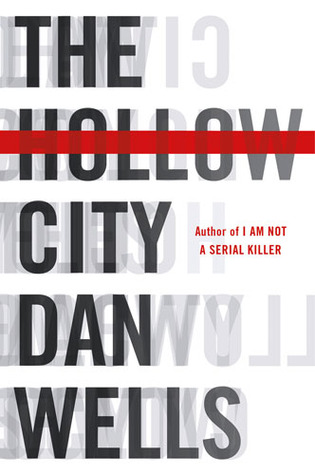 It’s no secret that I like Dan Wells’s writing. A lot. So I was nervous about The Hollow City
It’s no secret that I like Dan Wells’s writing. A lot. So I was nervous about The Hollow City
because I had high expectations. He totally lived up to them.
We talk about the writing process on Writing Excuses all the time. Today, Dan is going to tell you about his favorite bit.
DAN WELLS:
I started writing THE HOLLOW CITY several years ago, more as a thought experiment than anything else: could I write a schizophrenia novel? Could I write a schizophrenia novel that was also a horror story, AND a thriller, AND a cool mystery, and still make it all work? I did a lot of research into schizophrenia itself, and the treatment and medication and such, to make sure that I got it all right, but I quickly realized that the mental disorder wasn’t the hard part. Despite how hard they were, the constant shifts in reality weren’t really the hard part either. The hard part was tip-toeing through the vast minefield of schizophrenia cliches without blowing the entire book to smithereens.
 Some of the cliches are unavoidable. Part of me likes to read/watch/devour schizophrenia stories just because of the moment where you realize that one of the characters isn’t real. It’s a cliché, but it’s a fun one, and it’s a part of what attracted me to the genre in the first place. My answer to this was two-fold: first, I made sure that I focused a lot of attention on the other, less-flashy symptoms of schizophrenia, like depression and disorganized behavior. Hallucinations are the ‘cool’ part, narratively speaking, but the other stuff is far more important to how the disorder works, and the effects it has on the lives of the patients and their families. Being sure to give those aspects equal treatment expanded the book in some very neat ways, helping to take it in new directions I hadn’t anticipated. But that’s not my favorite bit.
Some of the cliches are unavoidable. Part of me likes to read/watch/devour schizophrenia stories just because of the moment where you realize that one of the characters isn’t real. It’s a cliché, but it’s a fun one, and it’s a part of what attracted me to the genre in the first place. My answer to this was two-fold: first, I made sure that I focused a lot of attention on the other, less-flashy symptoms of schizophrenia, like depression and disorganized behavior. Hallucinations are the ‘cool’ part, narratively speaking, but the other stuff is far more important to how the disorder works, and the effects it has on the lives of the patients and their families. Being sure to give those aspects equal treatment expanded the book in some very neat ways, helping to take it in new directions I hadn’t anticipated. But that’s not my favorite bit.
The other way I softened the cliché was to have the hallucinatory characters, once they were finally revealed, mean more and do more than the cliché usually allows. Imaginary characters are, after all, still characters, and can still do some very cool things. Playing with that, and finding new ways for the hallucinations to stay meaningful, was one of the most enjoyable parts of writing the book. But that’s not my favorite bit either.
Softening a cliché is not the same thing as avoiding it, and I wanted to really go the extra mile on this one. The core cliché of a schizophrenia story—of any story about hallucinations or delusions or madness—is the resolution, where the character slowly realizes that these things aren’t real, and sorts himself out, and triumphantly rejoins the normal world. THAT’S a cliché I can turn on its head, and that was absolutely my favorite bit. The main character, Michael Shipman, lives in a haze of false information, surrounded by monsters and conspiracies and sights and sounds and memories he can’t explain. He struggles to sort them out, but some of them won’t sort. Some of his hallucinations are real—not all, but some—and they are not the ones he likes. Instead of a book about curing the madness, THE HOLLOW CITY is a book about piecing together which bits of madness are a part of the puzzle, and what the puzzle means, and what he can do about it. There’s a sequence at the end where all of those pieces click into place, one after another, and the picture they form is terrifying. That’s absolutely my favorite bit.
I even named the book after it.
RELEVANT LINKS:
The Hollow City amazon | b&n| indiebound
BIO:
Dan Wells lives in Germany. A bachelor’s in English has led him to a successful career as a corporate writer for close to ten years. His first horror novel, I Am Not A Serial Killer is available from Tor books.

“It’s no secret that I like Dan Wells’s writing. A lot”
A good thing, Mary or else Writing Excuses would be awkward 🙂
Thanks, Dan, for sharing. A puzzle book with madness as a major piece. And I love how you came up with the title of the book!
Can’t decide if I want to take a look at this or not. My mom, grandmother, and aunt were all schizophrenic and they were the ones who raised me. It wasn’t fun. On the other hand, I’m curious what a book written about it might be like by someone who isn’t confusing it with multiple personality disorder (like pop culture typically does). Probably wildly different from how I’d approach it…
Dan said that he gave it to a friend of his, also raised by a schizophrenic mother, who said that it made her understand her mother more than anything else had.
I can understand why. While I have no experience with the illness personally, it just feels like Dan Wells did his research and knows what he’s writing about.